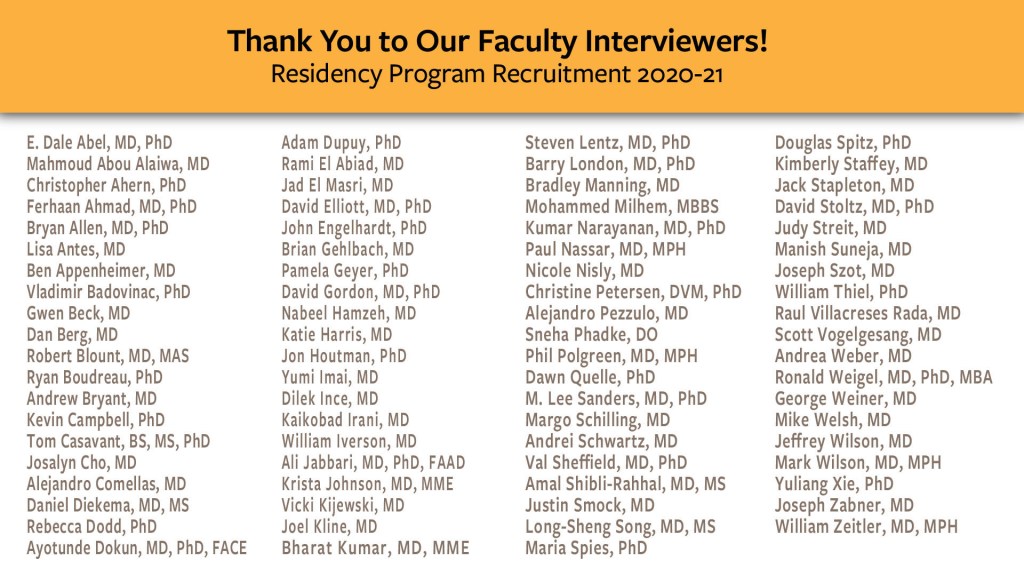It is always a nice feeling when you set your expectations high and still have them exceeded. That is what happened on last Friday’s Match Day, when we welcomed to Internal Medicine one of our most accomplished classes in recent memory. Our Vice Chair for Education and Internal Medicine Residency Program Director Dr. Manish Suneja and I revealed some basic information about the diversity of medical schools and states from which they are joining us. We keep a rolling list of these schools and mark them on a map, which our Design Center has just updated. They are a highly accomplished class, amassing experiences and successes including published scholarship during their medical school training that I would wager many of our senior faculty might not have achieved until well past residency. The competitive landscape for academic internal medicine programs is getting more intense and represents only one of many factors that today’s medical school graduates must weather in the current post-grad landscape. The months-long process of residency recruitment is a grueling one and this year was even more onerous, so I hope that our incoming interns know that they can either wear the badge of “Incoming Class of 2021” or “I Survived Virtual Recruitment” with singular pride. As recruiters, we had our challenges as well, and were it not for an incredible support staff and the generous faculty members listed below who conducted multiple interviews, we might not have been as successful as we certainly feel today. (And as excited as we felt making this video in anticipation of Match Day.)

Many of these incoming interns already have one or two peer-reviewed publications to their name, a remarkable achievement as a medical student. Whether or not they were published when they entered our program, by the time our residents graduate from our training program, there is no doubt that they will have experienced multiple opportunities to add some lines to their CV. We believe that preparing our trainees means an immersive exposure to the full measure of life in academic internal medicine. Residency training programs are now required by ACGME to ensure that residents conduct scholarly or research activity, but for those who want more than to check a box, our faculty go out of their way to mentor our trainees to bring their research to fruition as a publication. Consider two recent examples of our third-year residents. Dr. Jeff Rytlewski has just published two first-author papers, both of which were shepherded by medical oncologist Dr. Varun Monga. I was struck by Dr. Rytlewski’s final quote in response to this achievement about the guidance beyond the project that Dr. Monga provided. It is not all that uncommon at Iowa for faculty to form these strong mentoring relationships with our trainees, but it is always gratifying to see. The other recently published resident is Dr. John Rieth, also with an article in Cancers, which was published online a few days ago. We will have more details about his publication next week, but the senior author, Oncology Section Chief Dr. Mo Milhem, informs me that Dr. Rieth did most of this work in his second year and led the multidisciplinary team in the manuscript’s assembly. “John is a rising star and a joy to work with,” Dr. Milhem said. He will get to continue working with Dr. Rieth when his oncology fellowship here begins later this summer. Kudos to these two residents, their faculty mentors, and all of you who take the extra time to teach in these informal but absolutely essential ways.
It is important for us to reflect on the demographics of our incoming intern class as we celebrate and welcome all of our new trainees. Fifteen percent of our incoming class represents individuals who are underrepresented minorities (URiM), as federally defined, in medicine. This is similar to results in some of our peer institutions, but lower than others. We will have a better sense regarding the demographics of this year’s applicant pool when the NRMP releases its data in a couple weeks. Regardless of what they reveal, I believe that it is important for us to remain laser-focused in our future recruitment efforts to ensure that our program at Iowa will attract more applicants of color as we work toward ensuring that our trainees reflect the increasing diversity of the United States population. Available data from the AAMC reveal that the graduating class of 2022 will be ~15% URiM. Thus, although we can celebrate that our incoming class is representative of medical school graduates, we must not lose sight of the imperative of diversifying the entire pipeline of future medical talent from undergraduate through medical school.
AAMC’s data also reveal that 51% of medical school graduates are women. We acknowledge that the number of interns who identify as women in our incoming intern class is not the half that it should be. However, 44% of our categorical interns are women, outperforming this year’s national pool of internal medicine applicants, in which 38% of all applicants identified as female. As we have seen in this list of inspirational women in medicine, whom some of our faculty identified for Women’s History Month, examples of history-making women abound, but we must identify and raise up many more. There are many recent stories of women in leadership roles within the department, which we are proud to shout out, including a recent appointment of Dr. Saima Sharif as Medical Director of the oncology inpatient unit. Nationally, there has also been a recent run of women leaders among our faculty being elected to roles in prestigious professional organizations. Congratulations to Dr. Julia Klesney-Tait, Dr. Amy Dowden, and our Vice Chair for Research Dr. Isabella Grumbach. We also see leaders among our faculty on the frontlines of the pandemic, including Dr. Claudia Corwin and Dr. Kimberly Dukes, as they work to bring vaccinations to our state’s seasonal and migrant farmworkers. Their visible service and dedication matter. As such, we will double down on our efforts to increase the recruitment of women into future residency classes and to increase the recruitment, retention, and promotion of women in our own faculty.




Good stuff–congrats. My residency class in 79 was white males–I think I was the only minority (a left handed, agnostic Jew.).
Louie Katz MD
IM 79
ID 82